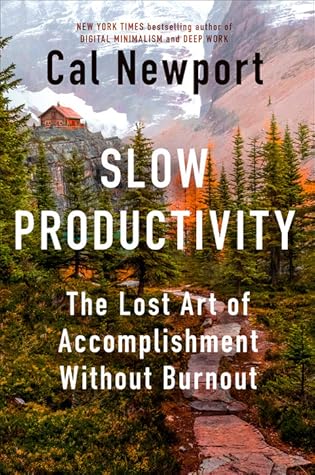More on this book
Community
Kindle Notes & Highlights
It couldn’t have existed, however, without McPhee’s willingness to put everything else on hold, and just lie on his back, gazing upward toward the sky, thinking hard about how to create something wonderful.
“We are overworked and overstressed, constantly dissatisfied, and reaching for a bar that keeps rising higher and higher,”
The relentless overload that’s wearing us down is generated by a belief that “good” work requires increasing busyness—faster responses to email and chats, more meetings, more tasks, more hours.
SLOW PRODUCTIVITY A philosophy for organizing knowledge work efforts in a sustainable and meaningful manner, based on the following three principles: 1. Do fewer things. 2. Work at a natural pace. 3. Obsess over quality.
this philosophy rejects busyness, seeing overload as an obstacle to producing results that matter, not a badge of pride. It also posits that professional efforts should unfold at a more varied and humane pace, with hard periods counterbalanced by relaxation at many different timescales, and that a focus on impressive quality, not performative activity, should underpin everything.
In knowledge work, by contrast, individuals are often wrangling complicated and constantly shifting workloads. You might be working on a client report at the same time that you’re gathering testimonials for the company website and organizing an office party, all the while updating a conflict of interest statement that human resources just emailed you about. In this setting, there’s no clear single output to track. And even if you do wade through this swamp of activity to identify the work that matters most—recall Davenport’s example of counting a professor’s academic publications—there’s no
...more
The carefully engineered systems of factories were replaced with the “personal productivity” of offices, in which individuals deploy their own ad hoc and often ill-defined collection of tools and hacks to make sense of their jobs, with no one really knowing how anyone else is managing their work. In such a haphazard setting, there’s no system to easily improve, no knowledge equivalent of the ten times productivity boost attributed to the assembly line.
PSEUDO-PRODUCTIVITY The use of visible activity as the primary means of approximating actual productive effort.
I think that’s where the burnout really hurts—when you want to care about something but you’re removed from the capacity to do the thing or do it properly and give it your passion and full attention and creativity because you’re expected to do so many other things.
A virtual assistant named Myra provided a unique perspective, as she could summarize what she noticed about the multiple knowledge workers that she served. “My clients are very busy, but are often so overwhelmed by everything they want or have to do, that it becomes difficult to recognize what the priorities are for them,” she told me. “So they just try to work on a lot and hope they make progress that way.”
Concrete productivity metrics of the type that shaped the industrial sector will never properly fit in the more amorphous knowledge work setting. (Nor should we want them to fit, as this quantitative approach to labor ushers in its own stark inhumanities.) In the absence of this clarity, however, pseudo-productivity can seem like the only viable default option.
KNOWLEDGE WORK (GENERAL DEFINITION) The economic activity in which knowledge is transformed into an artifact with market value through the application of cognitive effort.
To embrace slow productivity, in other words, is to reorient your work to be a source of meaning instead of overwhelm, while still maintaining the ability to produce valuable output.
SLOW PRODUCTIVITY A philosophy for organizing knowledge work efforts in a sustainable and meaningful manner, based on the following three principles: 1. Do fewer things. 2. Work at a natural pace. 3. Obsess over quality.
PRINCIPLE #1: DO FEWER THINGS Strive to reduce your obligations to the point where you can easily imagine accomplishing them with time to spare. Leverage this reduced load to more fully embrace and advance the small number of projects that matter most.
But we don’t need science to convince us of something that we’ve all experienced directly: our brains work better when we’re not rushing.


